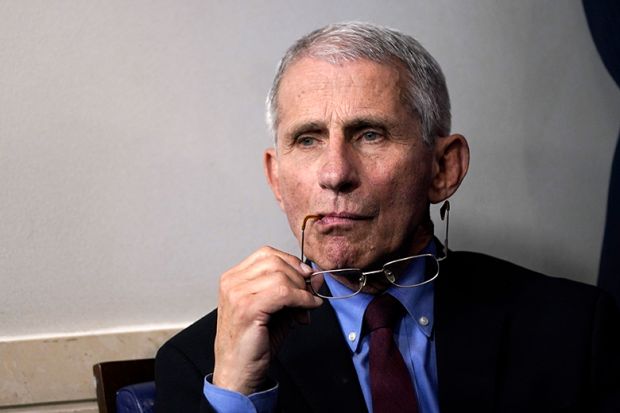The vilification of Anthony Fauci could explain why top-level administrators are not stepping forward to run America’s biggest basic research funder, according to experts who believe the lengthy delay in finding a permanent boss is harming US science.
The Biden administration has gone more than 16 months without finding a leader for the National Institutes of Health (NIH), stoking concern that the $51 billion (£42 billion) research agency is stagnating under the nation’s political dysfunction and outdated ethical restrictions.
Former NIH director Francis Collins announced his departure in October 2021 after a record 12-year term that was seen as remarkable for its effectiveness within widely divergent US presidential administrations and amid deepening partisan divides.
The NIH is generally understood to have a respected and experienced interim leader in Dr Collins’ deputy, Lawrence Tabak, who is serving as acting director. But with medical science advancing quickly and the research community hoping to see the NIH keep up – a highlight being last year’s creation of Arpa-H, a new NIH entity for pushing high-impact science – Dr Tabak’s prolonged caretaker tenure is raising concern.
“It’s dangerous overall for what happens in healthcare,” said Philip Bourne, professor of biomedical engineering and founding dean of the School of Data Science at the University of Virginia, who served for several years as the NIH’s associate director for data science.
The treatment of one of those institute directors, Anthony Fauci, could deter those considering a high-profile NIH position, Professor Bourne noted. Dr Fauci served for decades as head of the National Institute of Allergy and Infectious Diseases, which thrust him into a global spotlight during the Covid pandemic. In that role, he has faced vilification from members of Congress and death threats from the public, as some Republicans made him a scapegoat for political and personal frustrations over pandemic-related safety restrictions.
“A lot of people don’t want to be on the front line and have that kind of visibility,” said Professor Bourne.
Jay Shendure, professor of genome sciences at the University of Washington and a former NIH adviser, said the next director would need to “navigate both sides of the aisle in Capitol Hill at a time when the politicisation of science has become decidedly more fraught”.
That, however, “leads to a shrinking pool of candidates in terms of qualified individuals who are both willing and able”, Professor Shendure said. That is particularly true, he and other experts said, for the growing number of accomplished biomedical researchers who have established lucrative outside ventures that could require extensive divestments and lost income to meet governmental service requirements.
On top of that, the salary for the NIH director position is limited to about $200,000 – below even the amounts allowed by Congress for many of the directors of the agency’s own institutes and programmes.
It is a “ridiculous” amount given the expected qualifications, Professor Bourne said. One result, he said, is that when Dr Collins would meet with his top staff, he saw that “essentially everyone around the table is earning more than” him.
The problems underlying the Biden administration’s prolonged hunt for a new NIH director have probably been growing undetected for a while, said Stuart Buck, executive director of the Good Science Project, an advocacy group that supports scientific innovation. That is because the agency has had only two permanent directors over the past two decades, while so much in the scientific and political worlds changed dramatically, Dr Buck said.
Possible solutions exist but redefining financial conflicts of interest could also create problems, although for filling such an important position in US research, he said, “it seems like there ought to be better ways”.
Register to continue
Why register?
- Registration is free and only takes a moment
- Once registered, you can read 3 articles a month
- Sign up for our newsletter
Subscribe
Or subscribe for unlimited access to:
- Unlimited access to news, views, insights & reviews
- Digital editions
- Digital access to THE’s university and college rankings analysis
Already registered or a current subscriber? Login








